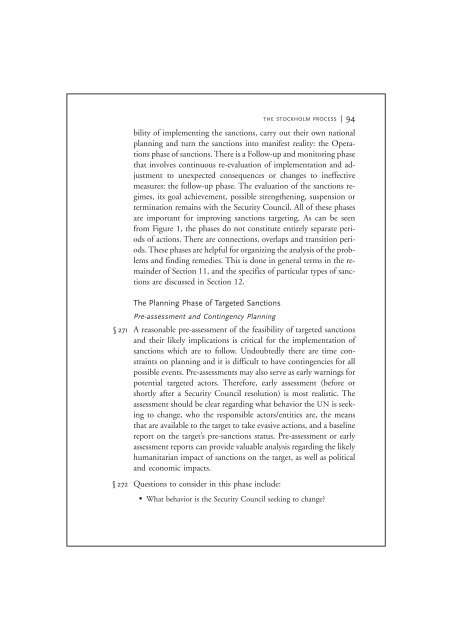Making Targeted Sanctions Effective - Small Arms Survey
Making Targeted Sanctions Effective - Small Arms Survey
Making Targeted Sanctions Effective - Small Arms Survey
You also want an ePaper? Increase the reach of your titles
YUMPU automatically turns print PDFs into web optimized ePapers that Google loves.
THE STOCKHOLM PROCESS | 94<br />
bility of implementing the sanctions, carry out their own national<br />
planning and turn the sanctions into manifest reality: the Operations<br />
phase of sanctions. There is a Follow-up and monitoring phase<br />
that involves continuous re-evaluation of implementation and adjustment<br />
to unexpected consequences or changes to ineffective<br />
measures: the follow-up phase. The evaluation of the sanctions regimes,<br />
its goal achievement, possible strengthening, suspension or<br />
termination remains with the Security Council. All of these phases<br />
are important for improving sanctions targeting. As can be seen<br />
from Figure 1, the phases do not constitute entirely separate periods<br />
of actions. There are connections, overlaps and transition periods.<br />
These phases are helpful for organizing the analysis of the problems<br />
and finding remedies. This is done in general terms in the remainder<br />
of Section 11, and the specifics of particular types of sanctions<br />
are discussed in Section 12.<br />
§ 271<br />
§ 272<br />
The Planning Phase of <strong>Targeted</strong> <strong>Sanctions</strong><br />
Pre-assessment and Contingency Planning<br />
A reasonable pre-assessment of the feasibility of targeted sanctions<br />
and their likely implications is critical for the implementation of<br />
sanctions which are to follow. Undoubtedly there are time constraints<br />
on planning and it is difficult to have contingencies for all<br />
possible events. Pre-assessments may also serve as early warnings for<br />
potential targeted actors. Therefore, early assessment (before or<br />
shortly after a Security Council resolution) is most realistic. The<br />
assessment should be clear regarding what behavior the UN is seeking<br />
to change, who the responsible actors/entities are, the means<br />
that are available to the target to take evasive actions, and a baseline<br />
report on the target’s pre-sanctions status. Pre-assessment or early<br />
assessment reports can provide valuable analysis regarding the likely<br />
humanitarian impact of sanctions on the target, as well as political<br />
and economic impacts.<br />
Questions to consider in this phase include:<br />
• What behavior is the Security Council seeking to change?
















